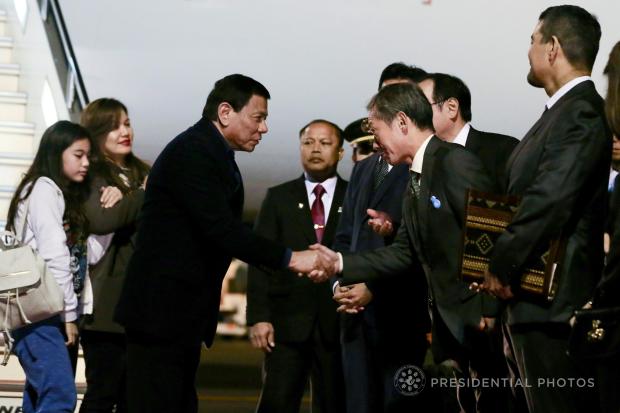Filipino, Japanese businessmen sign 25 deals worth $6B in investments

President Rodrigo Duterte gets a warm welcome from Japanese officials at Haneda Airport in Tokyo on Monday, Oct. 30, 2017. With him are his partner, Cielito “Honeylet” Avanceña, and daughter Veronica. (Photo from the Presidential Photographers Division)
Published: 8:04 p.m., Oct. 30, 2017 | Updated: 11:23 p.m., Oct. 30, 2017
TOKYO — The Philippines is getting some $6 billion in new investments after Filipino and Japanese businessmen signed at least 18 agreements during President Duterte’s visit to Japan.
Mr. Duterte arrived in Tokyo early on Monday for talks with Japanese Prime Minister Shinzo Abe on regional concerns, including North Korea.
He declared that the Philippines and Japan were embarking on their “golden age of strategic partnership,” as Abe promised maximum support for the rehabilitation of Marawi City and fleshed out the details of a 1 trillion yen aid package he promised the Philippines in January.
Expanding cooperation
With the two countries deepening their cooperation on economic and security matters, Mr. Duterte said they were resolved to further expand their cooperative ties.
“I daresay that considering all that we have accomplished and achieved, the Philippines and Japan are building the golden age of our strategic partnership,” Mr. Duterte said as he and Abe issued a joint statement.
“It’s a commitment founded on the democratic values we hold dear. It’s a resolve that has withstood the test of time. Working together, we should have much to show and to be proud of in the years to come,” he added.
Mr. Duterte thanked Abe for fleshing out the $9 billion he had pledged for the Philippines, which would go to “some of the most ambitious and groundbreaking projects,” including a subway system in Metro Manila, improvement of roads and disaster response.
Mr. Duterte visited Abe’s official residence on Monday afternoon, where he was given arrival honors.
The two leaders held a summit meeting, followed by private discussions.
They condemned North Korea’s ballistic missile tests and called on parties to open negotiations to put an end to the threat the tests posed.
“Foremost among our shared concern are developments [on] the Korean peninsula and the continuing missile launch tests of North Korea,” Mr. Duterte said.
Mr. Duterte and Abe agreed to tackle the many issues confronting the region, especially threats to stability and security in the Asia-Pacific region.
Abe congratulated Mr. Duterte for the leadership he exerted in dealing with the Marawi crisis and declared full support for the Philippine leader’s approaches to fighting terrorism and bringing stability to Mindanao.
“We will provide maximum support to the restoration and reconstruction of Marawi City, and we will strengthen support for Mindanao, and toward the establishment of an autonomous government, we will respond to the progress of processes,” he said.
Japan will provide equipment for the reconstruction and rehabilitation of the devastated city and surrounding areas.
It would consider providing further assistance, including those for road construction and improvement, based on postconflict needs assessment and the government’s master plan for reconstruction.
It would also consult with the government on building a society resilient to radicalism.
Given Abe’s support for Philippine efforts to fight terrorism and violent extremism in Marawi and his understanding of the cancellation of his Japan trip in June, Mr. Duterte said it was fitting that his first official trip after Marawi’s liberation was to Japan.
He described Japan as “a true friend who has stood squarely behind the Philippines in my country’s onward advance [to] greater peace, progress and prosperity.”
His and Abe’s discussions were “very warm, open and comprehensive,” he said.
The two leaders agreed to increase economic activities, and Mr. Duterte welcomed Japan’s growing number of investments in the Philippines, saying that the country was “ready to work with responsible companies [that] we consider our new partners for growth.”
Deals signed
Trade Secretary Ramon Lopez said the business deals signed involved the manufacturing industry, particularly shipbuilding, iron and steel; agribusiness; power; renewable energy; transportation; infrastructure; mineral processing; retailing; information and communication technology, and information technology-business process management.
Mr. Duterte met officials of several Japanese companies and witnessed the signing of business to business memorandums of understanding and letters of intent on investment plans and expansion of operations in the Philippines, Lopez said.
Lopez met with his Japanese counterpart, Trade Minister Hiroshige Seko, to discuss the improvement of Philippine products’ market access to Japan and the lowering of tariffs for the county’s agricultural products such as banana, pineapple and mango.
Lopez said his request to remove the tariffs would be the subject of future discussions.
“They took note of that and to be discussed in detail in the technical working groups under Jpepa [Japan-Philippines Economic Partnership Agreement],” he said.
/atm /pdi